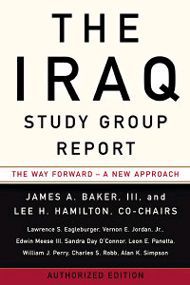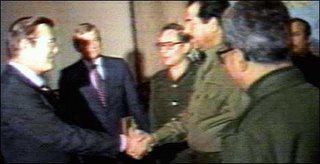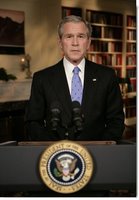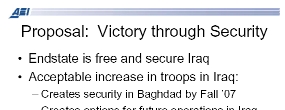The Way Forward
 I read the Iraq Study Group Report. You can find it in its entirety as a pdf here at the New York Times site. I have to confess that I learned much from its survey of the current situation in Iraq, which I think says more about the limitations of media coverage of the region than the depth of the Report. Whole countries receive little more than a paragraph's exposition about their relationship to Iraq and role in future intiatives in the region.
I read the Iraq Study Group Report. You can find it in its entirety as a pdf here at the New York Times site. I have to confess that I learned much from its survey of the current situation in Iraq, which I think says more about the limitations of media coverage of the region than the depth of the Report. Whole countries receive little more than a paragraph's exposition about their relationship to Iraq and role in future intiatives in the region.The authors make no sensational claims about the promise of their proposal. They open the report with a letter: "There is no magic formula to solve the problems of Iraq." The Executive Summary reinforces this sentiment: "There is no path that can guarantee success;" and this is echoed in the opening line of the first chapter, "There is no guarantee for success in Iraq."
They describe a situation in Iraq that is highly unstable, even moreso than I appreciated. Reading their survey of the context in Iraq, with its internal strife and neighboring countries compounding the problem, I began to appreciate the appeal of a puppet autocrat in a client state. Violence was never as bad now as it was under Saddam Hussein. And while Shia and Kurd lives were cheap under the Sunni Baathist regime, they're all cheap now. The number of civilian attacks that go on in Iraq on a daily basis is staggering. Roughly 10 civilians a day are killed, and about 180 attacks on US and Iraqi security forces occur each day. Any similar day occurring in Canada would be unthinkably tragic and alarming. I can't imagine a life in that context, with no end in sight.

Given the clear roadmap and numerous recommendations offered by the Iraq Study Group, I can't understand why the Bush II regime would focus on troop redployment, with an additional 20,000 troops, as the centrepiece of its renewed strategy. The ISG Report clearly states that what is required is a New Diplomatic Offensive, a typically American oxymoron of international relations. Recommendation 2 (p. 45) explicitly enunciates the components of this Offensive:
RECOMMENDATION 2: The goals of the diplomatic offensive as it relates to regional players should be to:
i. Support the unity and territorial integrity of Iraq.
ii. Stop destabilizing interventions and actions by Iraq’s neighbors.
iii. Secure Iraq’s borders, including the use of joint patrols with neighboring countries.
iv. Prevent the expansion of the instability and conflict beyond Iraq’s borders.
v. Promote economic assistance, commerce, trade, political support, and, if possible, military assistance for the Iraqi government from non-neighboring Muslim nations.
vi. Energize countries to support national political reconciliation in Iraq.
vii. Validate Iraq’s legitimacy by resuming diplomatic relations, where appropriate, and reestablishing embassies in Baghdad.
viii. Assist Iraq in establishing active working embassies in key capitals in the region (for example, in Riyadh, Saudi Arabia).
ix. Help Iraq reach a mutually acceptable agreement on Kirkuk.
x. Assist the Iraqi government in achieving certain security, political, and economic milestones, including better performance on issues such as national reconciliation, equitable distribution of oil revenues, and the dismantling of militias. That's a pretty clear path they're charting. I looked at Bush II's January 10 troop surge speech and there was little about diplomacy, although I found plenty that was offensive. The speech focused almost entirely on securing Baghdad and gave short shrift to Rice's diplomatic mission to compel regional players to play ball with the US.
That's a pretty clear path they're charting. I looked at Bush II's January 10 troop surge speech and there was little about diplomacy, although I found plenty that was offensive. The speech focused almost entirely on securing Baghdad and gave short shrift to Rice's diplomatic mission to compel regional players to play ball with the US.
At one point, Bush II states:
"The challenge playing out across the broader Middle East is more than a military conflict. It is the decisive ideological struggle of our time. On one side are those who believe in freedom and moderation. On the other side are extremists who kill the innocent, and have declared their intention to destroy our way of life."
The claim is so thick with hypocrisy that I get nauseated and dyspeptic just reading it. Has Bush II so little insight into the misery that the US inflicts on civilians caught in the crossfire? Or is it merely contempt for an audience that will swallow such lies? Is freedom and moderation what the US has supported in Saudi Arabia for the last sixty years? Or Israel? Could not Osama Bin Laden have made the exact same speech?
Bush II had no intention to follow the Iraq Study Group Report. His only interest in the Report was that its release be deferred until after the mid-term elections so it wouldn't leave the Republicans even more vulnerable.
 With the release of the Report, Bush II made a show of extensive consultations and ultimately pursued an option that was outlined by Frederick Kagan of the American Enterprise Institute in a report titled, "Choosing Victory: A Plan for Success in Iraq." The recommendation: basically, a troop surge to secure Baghdad because all other options would fail. For example, "Negotiating with Iran and Syria will not stop violence."
With the release of the Report, Bush II made a show of extensive consultations and ultimately pursued an option that was outlined by Frederick Kagan of the American Enterprise Institute in a report titled, "Choosing Victory: A Plan for Success in Iraq." The recommendation: basically, a troop surge to secure Baghdad because all other options would fail. For example, "Negotiating with Iran and Syria will not stop violence."
Fortunately, there may be other trends afoot in the region that don't involve the US and may, as a result, bear fruit. To wit: Turkey has been welcomed by Israel to inspect the construction around Al Aqsa mosque that recently spawned so much protest. Another: The leader of Hamas has stepped down as the democratically elected Palestinian PM, paving the way for a unified government and halting the slide to civil war amongst Palestinians, in a deal mediated—or at least hosted—by diplomatic wallflower Saudi Arabia.
Despite the US's efforts to avert peace, it just may flower in the desert after all.

Comments